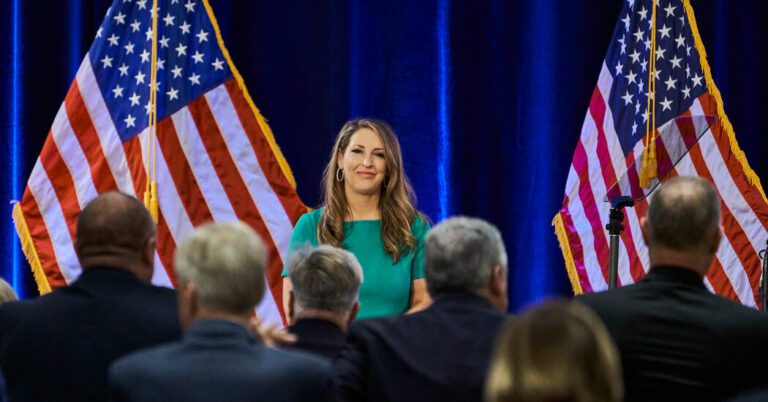
[ad_1]
The chairwoman of the Republican National Committee said on Monday that she would step down in just over a week, as former President Donald J. Trump seeks to install a new handpicked leader for the national party ahead of the general election this fall.
The decision is not a surprise. The chairwoman, Ronna McDaniel, told Mr. Trump weeks ago that she planned to leave shortly after the South Carolina primary, which was held on Saturday. But she now sets in motion a new election within the party’s official body, where Mr. Trump’s preference for chair and co-chair will try to secure enough votes to take over.
Mr. Trump has publicly backed Michael Whatley, the chairman of the North Carolina Republican Party and the national committee’s general counsel, to replace Ms. McDaniel. And he has said that he wants his daughter-in-law, Lara Trump, to be the next co-chair.
Mr. Trump’s remarks on the R.N.C. leadership came in the run-up to the South Carolina primary on Saturday, and in anticipation of his tightening his grip on the party. He ended up defeating his main rival, former Gov. Nikki Haley of South Carolina, by more than 20 points in her home state.
“I have decided to step aside at our spring training on March 8 in Houston to allow our nominee to select a chair of their choosing,” Ms. McDaniel said in a statement to The New York Times. “The R.N.C. has historically undergone change once we have a nominee, and it has always been my intention to honor that tradition. I remain committed to winning back the White House and electing Republicans up and down the ballot in November.”
Ms. McDaniel, the first woman chair of the R.N.C. in more than 40 years, thanked Mr. Trump and other Republicans for their support. She had been the chairwoman of the Republican Party in Michigan, and became the national committee leader in 2017, after Mr. Trump won the state in the 2016 election.
Ms. McDaniel called it “the honor of a lifetime” to have served in the role, and recounted her accomplishments during her tenure, including focusing on early voting and creating an election integrity unit after the 2020 election.
That unit focuses on an issue that Mr. Trump and his associates plan to push in the general election in 2024, despite no evidence of widespread fraud in the 2020 election and Mr. Trump’s allies having lost dozens of court cases related to that election. He has made it clear that he wants the R.N.C. to do more on election integrity.
Mr. Trump and his advisers have also expressed anxiety about the committee’s financial strain, although some of his allies concede privately that Mr. Trump has made that task more difficult over time. The R.N.C. reported raising $12 million in January, while the Trump campaign raised just under $9 million.
One key element of Ms. McDaniel’s tenure that her allies point to is that, under her leadership, the R.N.C. has not faced criminal charges or the kinds of expansive legal actions that have ensnared Mr. Trump and those supporters who helped him try to stay in power after he lost the 2020 election to President Biden.
R.N.C. officials let two of Mr. Trump’s lawyers, Rudolph W. Giuliani and Sidney Powell, use their headquarters to host a news conference where the lawyers made wild and false claims about voting systems in late November 2020, but party officials did not participate in that event. They also did not get involved in most of the legal efforts that Mr. Giuliani championed.
And while both Mr. Giuliani and Ms. Powell have been sued by Dominion Voting Systems for their baseless claims about the company’s machines, and Fox News faced an enormous settlement for libel claims, the committee was not caught up in it.
Ms. McDaniel has rarely been targeted by Mr. Trump publicly, and he called her a “friend” in a social media post after they had a long meeting two weeks ago, ahead of her expected departure.
Ms. McDaniel was overwhelmingly re-elected to a new term just last year. It has been many years since a party chair left the post during an election year.
For months, Ms. McDaniel was the subject of an intense pressure campaign by some of Mr. Trump’s most vocal allies in the right-wing news media ecosystem to force her from her post. They focused their frustrations over the party’s performance in 2022, not on the former president and the candidates he backed, but on the party chair.
For his part, Mr. Trump repeatedly pressured Ms. McDaniel to cancel the primary debates and, occasionally, according to people familiar with the discussions, the primary contests themselves. She resisted his push to call off the debates and did not have the power to cancel the caucuses and primaries, which are run by the states and the state parties.
Criticism from some of Mr. Trump’s allies for her performance was countered by praise for her work from several Republican officials who gave statements through the R.N.C., including Senator Steve Daines of Montana, the chairman of the Senate Republican campaign arm, and Representative Richard Hudson of North Carolina, the chairman of the House Republican campaign arm.
Kevin McCarthy, the former House speaker who was recently forced out of his seat by hard-right members of his caucus, described her as a “strong leader” and said she was “instrumental in helping us win back the House majority” after losing it in 2018.
“Her leadership in the party helped expand the electoral map and supported candidates that are now rising stars,” Mr. McCarthy said.
[ad_2]